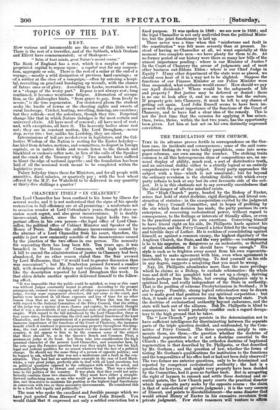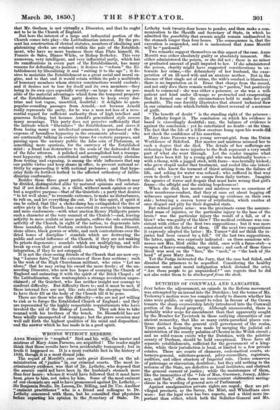THE TRIBULATION OF THE CR ItCH.
TIME in its advance proves fertile in correspondence on the Gor- ham case, its incidents and consequences ; some of the said corre- spondence finding its way into bulky pamphlets, some into news- paper columns, our own among the number. The striking traits common to all this heterogeneous class of compositions are, an un- usual display of ability, much zeal, a sort of distributive truth, and an universal dislike either to a strictly logical or an entirely comprehensive view of the subject. Every party approaches the subject with a bias—which is not unnatural ; but far beyond the ordinary revulsion is the shrinking dislike with which every party refuses to look at any but its own favourite side of the sub- ject. It is in this obstinate not to say cowardly onesidedness that the chief danger of ulterior mischief exists. The "High Church" party, headed by the Bishop of Exeter, seizes fast hold of strict doctrine, rigid discipline, and literal con- struction of statutes : in the exasperation excited by the judgment of the Privy Council Committee, and in hopeo of profiting by the stir which that decision has made, the party pursues its own enterprise, of recovering ecclesiastical power, without regard to consequences, to the feelings or interests of friendly allies, or even to the practical success of its own exertions. Conceiving himself to have literal right on his side, Dr. Phillpotts hurls against his metropolitan and the Privy Council a letter fitted for the wrangling and terrible days of Luther. He is reckless of consolidating against himself, as against a common enemy, the highest dignitary of the Anglican Church, the State, and the very public—so contemptuous is he to his superior, so dangerous as an ecclesiastic, so threatful of clerical absolutism if he should have "rope enough." His style is such as to frighten away assent from his own representa- tions, and to make agreement with him, even when agreement is inevitable, by no means gratifying. To find yourself on his side in any degree, suggests a misgiving that you must be wrong. Nay, Dr. Phillpotts adumbrates more than the mere privilege which he claims as a Bishop, to exclude schismatics : the whole tone and drift of his pamphlet tend to set up a clergy, deriving tribute perhaps from the State, but owning allegiance only to a spiritual head, and really independent of the State in authority. That is the position of extreme Presbyterianism in Scotland ; it is also Popery. Possibly, strong logical ratiocination may be drawn out to make good that position for any spiritual corporation : but then, it tends at once to severance from the temporal state. Push the doctrine of ecclesiastical authority beyond endurance, and the state will back out of the alliance. But Dr. Phillpotts is blind to consequences ; he would probably consider such a regard deroga- tory to the high ground that he talei.
The " Low Church " partysists in the determination not to
have sufficient intelligence for between the separate parts of the triple question decided, and confounded, by the Com- mittee of Privy Council. The three questions, simply to enu- merate them, are these,—the .question whether the doctrine of baptismal regeneration is or is not a doctrine essential to the Church ; the guestion whether the orthodox doctrine of baptismal regeneration is that described by Dr. Phillpotts, or that described by Mr. Gorham ; and the question of law, whether the forms of testing Mr. Gorham's qualifications for institution to the functions and the temporalities of his office had or had not been duly observed? The two former are anterior questions, only to be determined and reported by competent ecclesiastical authority ; the last is a question for lawyers, and might very properly have been decided by the Committee, had it gone no further back. But in arrogating the right of laymen to ransack and settle these doctrinal and es- sential points, the Levi Church party courts the practical disaster which the opposite party seeks by the opposite course : the claim is that of non-clerical or private judgment ; it is the very essence of Dissent, and points to disestablishment—the same disaster that would attend Henry of Exeter in his excessive revulsion from private judgment. Few strict reasoners will venture to affirm
- - that Mr. Gorham is not virtually a Dissenter, and that he ought not to be in the Church of F.ngland.
But here the interest of a large and influential portion of the Church comes into play—the Latitudinarian interest. By the pre- sent lax construction of clerical statutes, numbers of idealizing and platonizing clerks are retained within the pale of the Establish- ment, who have no more business there than Plato himself, St. Francis de Sales, Blanco White, or Bishop Berkeley. This very numerous, very intelligent, and very influential party, which has its ramifications in every part of the Establishment, has many reasons for defending its position : it desires to "reform" the Es- tablishment by liberalizing it and " suiting it to the age " ; it de- sires to maintain the Establishment as a great social and moral en- gine, and to that end it would retain within its pale a multitude of honorary members whom stricter constructions would exclude"; and it desires not to lose for itself and its own members—they being in its own eyes especially worthy—as large a share as pos- sible of the material advantages which form the temporal property of the Establishment. This party desires to keep every doc- trine and test vague, unsettled, doubtful : it delights to quote popular-sounding passages from Arnold,—not because Arnold really represents the party, for he was a man not less of a reve- rential regard for sufficient authority than of high intellect and generous feeling, but because .Arnold's generalized style covers many meanings. This party does not perceive sufficiently that the latitude which " liberalizes " the Establishment, and saves it from losing many an intellectual ornament, is purchased at the `expense of boundless hypocrisy in the ornaments aforesaid ; who are continually talking in esoteric terms for exoteric purposes, and Pissing upon the unwary public the false coin of Platonism, or something more spurious, for the currency of the Established Mint : a fraud less destructive' to the souls of the defrauded than of the false utterers. A polished and accomplished but a transpa- rent hypocrisy, which constituted authority courteously abstains from testing and exposing, is among the wide influences that sap Our public virtue and keep shams in office, to prevent national ac- tivity by superseding it with national pretences ; and that hypo- crisy finds its fertilest hotbed in the affected orthodoxy of latitu- dinarian conformit Besides these three great parties into which the Church may be divided, distinguished alike by matured opinions and substan- tial if not defined aims, is a third, without much opinion or any but a negative purpose—that of the Quietists ; a party that desires ." to let well alone," to reconcile extremes, to make no disturbances, to rub on, and let everything die out. It is this spirit, if spirit it tan be called, that like a choke-damp has extinguished the fire of active piety in the Church ; has converted its servants to trimmers and mere conformists—with what unction Henry Phillpotts paints such a character at the very summit of the Church !—and, leaving activity to mere zealots or mere pedants, suffers the sole ostensible activity of the Church, in sight of the nation, to degenerate into these scandals, about Gorham crotchets borrowed from Dissent, stone altars, black gowns or white, and such contestations over the -dried bones of discipline ! scandals which are destroying the public and social influence of the Church, if they are not its priests degenerate ; scandals which are multiplying, and break up even that great and stable-looking body by internal dis- integration, if they be not estopped. It is not the clear-seeing friends of the Church that are now cry- ing " Laissez faire," but the extremes of these four sections : such is the wish of the High Churchman militant, who cries " Let me -alone," that he may swing his sword the more freely ; of the un- seceding Dissenter, who now has hopes of usurping the Church of England and animating it with the spirit of the Brick Chapel ; of the Latitudinarian, who contemplates a strange revolution unpro- -claimed ; of the Quietest, who has neither insight nor courage to confront difficulty. But difficulty there is ; and it must be met, if these internal foes are-'not, like rats about the sleeping traveller, to have their fill on the body of the Church till it be gone. There are those who see this difficulty—who are not yet willing to risk or to forego the Established Church of England ; and they are represented by the highly respectable requisitionists who have invoked the aid of the Bishop of London. They ask him to take counsel with his brethren of the bench. Dr. Bloomfield has not been wholly unsuspected of leanings ; but the grave occasion may well call forth the highest qualities of his mind and disposition ; and the answer which he has made is in a good spirit.



























 Previous page
Previous page